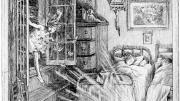The Idea of America: Reflections on the Birth of the United States, by Gordon S. Wood, Ph.D. ’64 (Penguin, $29.95). Essays from the past half-century on the American Revolution, the making of the Constitution, and the early Republic, by the eminent historian (now emeritus at Brown)—winner of the Bancroft and Pulitzer Prizes and National Humanities Medal—who has done foundational work in all these fields.
Rising Force, by James D. Livingston, Ph.D. ’56 (Harvard, $27.95). A popular introduction to the “magic” of magnetic levitation, by a former physicist at General Electric and lecturer at MIT, who knows how to have fun with his subject. Your kids will love the picture of the levitating frog.
The Annotated Peter Pan: The Centennial Edition, edited by Maria Tatar, Loeb professor of Germanic languages and literatures and of folklore and mythology (W.W. Norton, $39.95). Just as Archie and Veronica and the Riverdale gang remain ageless teenagers, J. M. Barrie’s airborne hero is a young centenarian. Tatar, profiled in these pages in 2007 (“The Horror and the Beauty,” November-December), provides context and notes. Profusely illustrated.
Midnight Rising: John Brown and the Raid That Sparked the Civil War, by Tony Horwitz, RI ’06 (Henry Holt, $29). The author, a shoe-leather historian/journalist who writes vivid narratives (including the classic Confederates in the Attic), here brings the Harpers Ferry events crackling to life.
American Anthrax, by Jeanne Guillemin ’68, A.B.E. ’68 (Henry Holt, $27). A security-studies fellow at MIT probes the seven-year investigation of the anthrax attack after 9/11.
The Better Angels of Our Nature: Why Violence Has Declined, by Steven Pinker, Johnstone Family professor of psychology (Viking, $40). The author, best known for his studies of human language and cognition, turns his attention toward our use of fists and what he terms a diminution of bloody behaviors across history.
Why Trilling Matters, by Adam Kirsch ’97 (Yale, $24). The author, among the most productive and perceptive of contemporary critics (and a contributing editor of this magazine), revivifies the leading literary critic of an earlier era for the current one, when literature appears on less firm footing.
1812: The Navy’s War, by George C. Daughan, Ph.D. ’68 (Basic, $32.50). The ground-based Civil War took place 150 years ago; the drone-dominated U.S. campaign in Afghanistan is now a decade old. Historian Daughan recalls the 200th anniversary of a less-remembered conflict, when the overmatched Americans faced Britain’s terrifying navy.
Columbus: The Four Voyages, by Laurence Bergreen ’72 (Viking, $35). Continuing the nautical theme: having dramatized the adventures of Magellan and Marco Polo, the author now recounts Columbus’s voyages, and not just the celebrated initial one.
Living Originalism, by Jack M. Balkin ’78, J.D. ’81 (Harvard, $35). The Knight professor of constitutional law and the First Amendment at Yale argues with full scholarly force that originalism and a living Constitution (incorporating modern conceptions of civil rights, health, the environment, etc.) are compatible—that constitutionalism requires continuous construction.
People’s Warrior, by Michael R. Lemov, LL.B. ’59 (Fairleigh Dickinson, $27.95 paper). The former chief counsel to the late Representative John Moss, a 13-term Congressman, narrates the battles over the Freedom of Information Act and the Consumer Product Safety Commission—the sort of thing Congress did before it turned to debates over defaulting on U.S. debt.
Tocqueville and His America: A Darker Horizon, by Arthur Kaledin ’52, Ph.D. ’65 (Yale, $45). An emeritus MIT historian considers Tocqueville’s inner life, its relationship to his iconic Democracy in America, and his later concerns about the underside of democratic culture.
Haiti after the Earthquake, by Paul Farmer, Kolokotrones University Professor (PublicAffairs, $27.99). A heartbreaking reminder of what befell the battered people of Haiti in January 2010, and what has happened since, by the Partners In Health founder who has worked to alleviate suffering for decades in a country where the disasters have long been of the manmade variety.
Elie Siegmeister: American Composer, by Leonard J. Lehrman ’71 and Kenneth O. Boulton (Scarecrow Press/Rowan & Littlefield, $75). A biographical essay on and catalog of the works of the composer of symphonic, operatic, movie, and other musical works.









